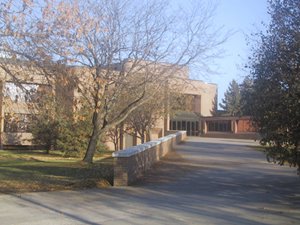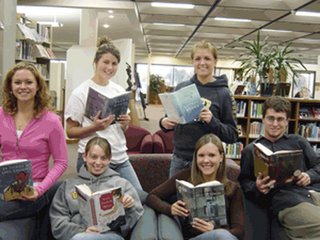
Here's the tree in all its hand-made glory. Photo courtesy of Kathie Martin.
It's hard to believewe're one day away from the end of finals - the library is packed on Monday afternoon with students studying together, hunching over books on the "quiet floor" and working on last-minute papers. Students are checking out books to read over the break (and, by the way, we have another list of new books up on our Web site), and on the main floor there's a hum of conversation as students study together.
But that's nothing new. A Gustavian Weekly editorial from 1960 titled "Chaos Reigns At Library" complained about the popularity of the library. (Thanks to Mike Haeuser for pointing it out.) "At least fifty percent of the scholars go to the library to 'spend the evening,' and a sizeable percentage of the remaining half engage themselves in a few exceptionally long study breaks. The library has thus become a social center, a condition long recognized but which is now being aggravated even further by the increased number of students streaming into the traditionally quiet chambers."
The authors of the editorial recommended action: "In order to halt the chaos which is now reigning at the library, students must either accept a personal responsibility to retain a quiet atmosphere or they must be reprimanded by a policing system, as in high school." Wonder what this critic would have thought about cell phones?
We're happy they stream in, now, and we don't mind a little chaos. Having designated one floor for quiet study appears to have given students the choices they want, while students who need to work together can do so. In fact, if the library were too quiet we'd have to wonder what we were doing wrong.
Have a good holiday and a pleasantly chaotic new year.



